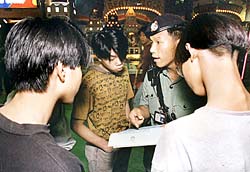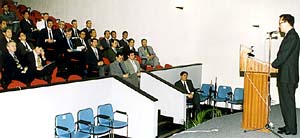



















|
Integrity, discipline, openness and professionalism remain key to public confidence in police | |
|
In its determination for continuous improvement and quality of service, the Hong Kong Police Force's
second Public Opinion Survey continues to confirm the public's confidence and unshakeable belief in
the integrity, discipline, openness and professionalism of its police-despite being conducted during the
same period that the Force dealt swiftly, decisively and transparently with two widely publicised cases
involving a handful of officers accused of wrongdoing
WITH the public rating the Hong Kong Police Force's overall performance, its overall performance in the prevention and detection of crimes, and their own sense of safety living in Hong Kong as very high, it was an understandably upbeat Deputy Commissioner of Police (Management). Tsang Yam-pui, who presided over a meeting of his senior top-ranking officers and managers to discuss the results of the survey which was conducted by an independent market research company. |  Despite the Force's second Public Opinion Survey's new findings that a sizeable minority thought there was room for police performance improvement in such areas of juvenile crime, drug abuse and police liaison with youth and schools, the fact is that teenagers have always been a high priority with Hong Kong Police officers. Here PC Lam Yung-shing explains to youngsters at an amusement arcade in Kwai Tsing district the danger of drugs |
|
"The results of this public opinion survey are very good," said Mr Tsang. "I'm sure you will appreciate that there is much to be proud of with the overall work that the Force is achieving and the positive image we project. You will be very pleased to hear that we scored highly in this survey in respect to integrity and discipline. Such scores are not easily achieved. "However," DCP MAN emphasised, "we cannot be complacent. It is not sufficient for us to say how good we are. It is important to know whether the community shares the same view. We are part of a sophisticated, progressive society which is placing increasingly greater demands on its public servants and expects a lot more from us than they did before. We must recognise the importance of the need to meet their expectations. We must also recognise that there is always a gap between how we think we perform and how the public thinks we perform. It is up to us to narrow that gap as far as possible. Conducting surveys such as this is an important step in the direction." The first Force Public Opinion Survey, conducted in 1995 with the idea of repeating it every two years, established a baseline measurement of opinion for Force management to determine what public perceptions of the police are, and on the service provided to the community. The second survey establishes a new baseline for those issues not covered in the first survey and enables the Force to compare its performance with that of two years ago in areas that are common to both. The first phase of the recent survey was organised through focus group discussions with representative members of the public to identify what issues or concerns they had regarding police services. The second phase entailed designing a telephone survey questionnaire based on those discussions, and where possible using the same language they used. "The objective of the survey (conducted from 31 October to 21 November 1997), was to measure the public's perception of police performance in the provision of various services for which the Force is responsible; to ascertain major areas of public concern about law and order; and to gauge people's sense of safety living in Hong Kong." said Archie Man, Managing Director of the independent marketing and research company that conducted the survey. "Totally, 2,709 valid domestic household telephone numbers were randomly drawn and 2,017 successful interviews were achieved, including, and unlike in the first survey, a sampling of responses from the age group of 15 to 17 years." The survey's main findings were generally encouraging. "Actually, the results of this survey are very good, with the public rating the Hong Kong Police Force's overall performance as very high, "commented poll director Man. "Seventy per cent of those questioned feel absolutely safe and secure in Hong Kong. This is quite an achievement. "Let me also say, "continued Mr Man, "that in my company's long experience in the field of market research, the Hong Kong Police Force has been our only law enforcement customer. In fact, I can think of very few police forces in the world that are open enough to actually conduct this type of a public opinion survey - then openly publish the results." | |
 DCP MAN Tsang Yam-pui discussing the results of the latest Force Public Opinion survey with his senior officers |
ABOUT three-quarters of respondents (73%) considered the overall performance of the Force as good (no significant change to the 1995 survey). A high proportion of respondents (79%) have a "strong" sense of safety living in Hong Kong, while few (only 3%) think the opposite. In terms of preventing and detecting crimes, over half of respondents (53%) rate police performance as good, while few (55)rate it poor(no significant change tp the 1995 survey). |
|
Half to three-quarters of respondents considered the Hong Kong Police performance good in the following areas: maintaining order during demonstrations and public events; regulating traffic and prosecuting illegal drivers; illegal immigration; and violent crime and crime involving firearms, narcotics and triads. In addition, police handling of emergencies, the adequacy of Force equipment and reporting facilities, and the quality of police officers all attracted favourable ratings. When compared with 1995, significant improvements to public perceptions were noted in the following areas: integrity and discipline within the Force; overall manpower; and manpower for street patrols. "On the other hand," explained Mr Man, "there were some areas where although the majority opinion was favourable, a sizeable minority thought that there was room for improvement in police performance. These areas include: juvenile/youth crime involving triads; theft, fighting and drug abuse; vice activities; border crime; theft of vehicles; sex offences; burglary and theft; police marksmanship with firearms; and liaison with the public, particularly police liaison with youth and schools." When asked which areas of police responsibilities are most important to the public and which should be accorded highest priority, the following were most mentioned by respondents: juvenile and youth crimes(all types); burglary and theft; illegal immigration; corruption in the Force; and the quality of police officers (especially their service manner). The Force is now examining the findings of the survey in detail to determine what follow-up action needs to be taken in the areas of concern. This may take the form of steps to improve performance or to provide more comprehensive information and facts in order to bring about a better understanding by the public in respect to these issues. This and other types of surveys will continue to be a regular feature of efforts by the Hong Kong Police Force to improve the quality of service they provide to the public. In particular, the Force had already conducted, in 1997, the first of a regular Customer Satisfaction Survey to complement the Public Opinion Survey. Additionally, the Force is currently running a pilot project focusing on customer service improvements at North Point Police Station. The objectives of the project are to identify and implement improvements to all aspects of customer handling within the police station and to create a "report room of the future". "The results of these surveys are extremely useful in identifying areas for improvement," said DCP MAN Tsang Yam-pui. "As this latest Public Opinion Survey shows, there are areas which need improvement - and these will be addressed." Mr Tsang reminded all those present at the briefing that they had a role to play in understanding where the Force is not meeting publice expectations and called upon them to take appropriate action in order to raise the public's satisfaction levels. "In an open and accountable police force such as ours," he said , "we need to take note of what may be just public perceptions which may not always represent the true situations. For example, according to the survey, in the area of juvenile crime the public, especially the parents, want us to do more. But maybe the Force is doing enough in that area and the public just doesn't know about it. The questions then become: Why does the public think in such a way? And, how do we make them aware of what the Force is doing? "It is up to us to find out why the public thinks in such a way-and then do what we can to correct any misconceptions." "I would ask you to address your management teams and discuss with them what action is necessary to improve the areas where the public is most concerned." | |

